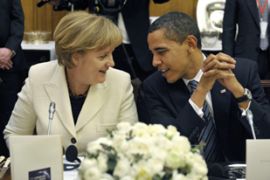G20 focuses on fixing world economy
More popular protests expected as world’s richest nations try to tackle financial crisis.

Leaders from the Group of Twenty (G20) are holding talks in the British capital on Thursday in an attempt to reach a unified stand on how to kickstart the ailing global economy, which is suffering its worst recession in 80 years.
The meeting, which is seen as make-or-break, will be held behind closed doors and includes leaders from the US, China, Russia, Britain and Saudi Arabia, among others.
Differing approaches
There have been indications before the summit that G20 members are divided on how best to pull the global economy out of recession.
The US and Britain are in favour of pumping more money into the financial system, seeing the strategy as a way to encourage banks to lend to consumers and thus entice them to spend money on goods and services.
The US has so far spent, lent or guaranteed $12.8 trillion – almost as much as the value of everything produced in the country in 2008.
| In depth | ||
|
G20 jargon buster Reporter’s log: On the road with Obama In video: G20 protests rock London financial area |
But France and Germany have signalled their opposition to further fiscal stimulus packages, calling instead for an emphasis to be placed on increasing regulation of the international financial system.
Jonah Hull, Al Jazeera’s correspondent at the summit, said that there is a sense of “managed expectations” about what leaders will agree on.
“It is critical for all concerned, and not least for the global economy itself, that this summit is deemed a success,” he said.
“It is a very powerful gathering and if anyone can do anything about the financial crisis, this is where it can be done.
While the topics of fiscal stimulus and financial regulation are likely to dominate the summit, other issues could be addressed.
“They will also be looking at protectionism, trying to make sure that countries do not run in fear from the consequences of this crisis by protecting industries in their countries at the expense of global trade – which would be one sure-fire way of making things worse,” Hull said.
“Then there are poor countries, which are desperately trying not to be forgotten in all this.
“This is not a crisis that has just affected rich countries. The African Union has called the crisis a potential ‘financial tsunami’ that could devastate developing economies.”
Protests expected
Protesters have planned to hold demonstrations to coincide with the opening of the summit, a day after thousands of demonstrators filled central London.
The protests on Wednesday largely focused on urging G20 leaders to make sweeping changes to the global financial system.
| Your Views |
|
What would you like to see the G20 summit achieve? Send us your views |
The protests started peacefully but, within hours, police had hemmed the demonstrators into pens and some areas descended into violence.
A man who collapsed near the Bank of England at about 7.30pm (18:30 GMT) later died in hospital.
Officers said they had moved the man behind a police cordon as protesters hurled bottles at them. The authorities did not give a possible cause of death.
While anti-capitalist protesters and those angry over the economic crisis converged on London’s financial district on Wednesday, climate-change and anti-war activists gathered in other parts of the city.
Some protesters smashed the windows of the offices of the Royal Bank of Scotland and wrote “thieves” on the side of the walls of the bank.
The bank, which has come to be seen as a symbol of everything wrong with the financial system, posted a $34bn loss last year, the worst ever in British corporate history, prompting a government takeover costing British taxpayers billions of dollars.
Police said a number of their officers were injured in the protests and added that there had been “a number of missiles thrown at officers and a number of surges at the police cordons, and increasing levels of violence towards police”.
More than 30 people were arrested, with police mounting one of Britain’s biggest security operations.
Bankers blamed
Michael Rainsvro, a protester from the G20 Alternative movement, told Al Jazeera that the demonstrators outside the Bank of England wanted a “real dialogue” about the world’s economic future.
|
Follow Al Jazeera’s correspondents at the G20 summit.
|
“We are seeing 20 men in a room making decisions for the 20 richest countries in the world, but these decisions effect the entire world,” he said.
“We came to the central bank of England to say: this is not just a problem with a few regulators and a few bad bankers, this is a problem that has been going on for years.”
Shop fronts and restaurants were boarded up to protect them from the protests, and helicopters hovered over the demonstrations.
“I am angry at the hubris of the government, the hubris of the bankers,” Jean Noble, one of the protesters, said.
“I am here on behalf of the poor, those who are not going to now get their pension or who have lost their houses while these fat cats keep their bonuses, hide their money in tax havens and go and live where nobody can touch them.”
A smaller demonstration against Britain’s military role in Iraq and Afghanistan attracted several hundred people in Trafalgar Square.

